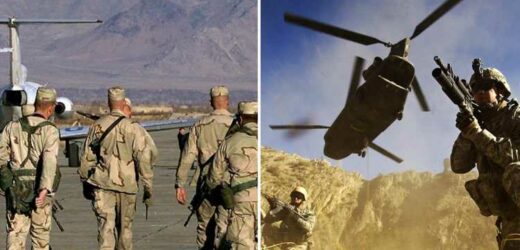TALIBAN forces "welcome and support" the decision by US and NATO troops to leave Afghanistan's Bagram airfield after 20 years in the war-torn region.
Officials said the HQ was the epicenter of the US war against Al-Qaeda and the Taliban.
One of the officials also said the US top commander in Afghanistan, Gen. Austin S Miller, “still retains all the capabilities and authorities to protect the forces.”
And, Army General Mark Milley said it's not "necessary" for US troops to remain at Bagram, The Washington Post reports.
Taliban officials reportedly welcomed the decision by US and NATO troops to leave the country's biggest airbase.
Taliban spokesman Zabihullah Mujahid said: Their full withdrawal (from Afghanistan) will pave the way for Afghans to decide about their future between themselves."
It remains unknown when the airbase will be officially handed over to Afghan troops.
The withdrawal comes amid fears that American troops risk leaving behind a nation on the verge of disaster.
US General Scott Miller has warned the country is on the verge of a "civil war" as Taliban militants have seized more than one-third of Afghanistan.
He said: "That should be a concern to the world."
It's also feared that Afghanistan could be a "new haven" for terrorist forces amid concerns that new training camps could be in operation from September.
Robert Clark, from the national security think tank Henry Jackson Society, warned other terror groups such as ISIS will look to stake their claim to Afghanistan.
He said while the Taliban may try to stick to peace terms agreed with Washington, other jihadi groups do not have to adhere to such pledges.
20 years in Afghanistan – what happened?
US forces have begun a full withdrawal from Afghanistan under the orders of US President Joe Biden after spending 20 years fighting to stabilize the war-torn nation.
US forces have begun a full withdrawal from Afghanistan under the orders of US President Joe Biden after spending 20 years fighting to stablise the war-torn nation.
Some 456 British soldiers and 2,420 Americans – along with hundreds of other coalition troops – died during the war which was sparked by the September 11 attacks.
And the civilian casualties are estimated to have been almost 50,000.
Codenamed Operation Enduring Freedom, the US led an invasion off Afghanistan to oust the Taliban after al-Qaeda flew planes into the World Trade Centre and other US buildings in 2001.
The mission was to oust the Taliban, who were said to be harbouring terrorists and providing them a safe haven – including Osama bin Laden.
What followed was nearly 20 years of grinding conflict as the US, its allies, and the Afghan security forces staged a grinding campaign to attempt to rebuild the country and beat back the Taliban.
The Taliban had ruled most of Afghanistan following the Afghan Civil War in the 90s – sparked by the withdrawal of the Soviet Union.
Western nations had actually supported the Taliban in the 80s as the ran an insurgency against the Soviet backed regime of Mohammad Najibullah.
However, after seizing power in 1996 – the Taliban brutally ruled Afghanistan and offered a safe haven to terrorist killers like Osama.
As the US war rolled on into the 2010s, Bin Laden was killed in May, 2011, in a US special forces raid in Abbotabad, Pakistan.
And since then there has been a slow withdrawal, with British troops officially ending combat operations in October 2014.
February 2020 saw a peace deal signed between the US and the Taliban in Doha, Qatar, which agreed to a withdrawal – whoever the Afghan government criticised it as being done behind "closed doors".
Taliban forces have since continued their operations and have been gaining ground – and the US continues to pull back its troops.
The war is seen as defeating the Taliban and improving the lives of the Afghan people who were once living under strict Islamic law and who now have free elections.
However, for some, it is an unfinished job that was mishandled – and that may 20 years on simply see a return to the dominance of the Taliban as they did pre-9/11.
Mr Clark told The Sun Online: "Whether [the Taliban] will stick to that is another question but they will be likely to do so to avoid US troops returning but it doesn’t mean they can control other terror groups, such as ISIS, who will look to take advantage and will look to recruit and train there.
"They hold no such agreement. It could become a terror battleground."
The Taliban reportedly seized control of a third of Afghanistan as they continued to accelerate their blitz offensive.
A 2020 Defense Department report revealed that Washington had spent $815.7billion on war-fighting.
US Congress found that around $19billion had been lost to waste, fraud, and abuse between May 2009 and December 31, 2019.
The exit is a sign that the last of the 2,500 troops have left Afghanistan as part of Biden’s plan to withdraw all US soldiers by September 11 – the 20th anniversary of the 9/11 attacks on the World Trade Center.
But, remaining troops may be withdrawn from Afghanistan by July 4, The Telegraph reports.
Most read in News
ROAD RAGE TRAGEDY What to know about Yancy Noll and his murder
Death row killer wanted THREE PINTS of strawberry ice cream before execution
Luxury life of girl who became a millionaire at SIX & had chauffeur-driven car
Family of 3 all found dead in their car days after going missing in bad weather
More than 2,400 US troops have been killed in the fighting while around 20,000 have been left injured.
Biden announced in April that he wanted the remaining troops to be out of Afghanistan by September 11.
But, GOP lawmakers accused the Democrat of "paving the way for another terrorist attack" as Sen. Lindsey Graham said terrorists around the world were on "steroids".
Source: Read Full Article


















